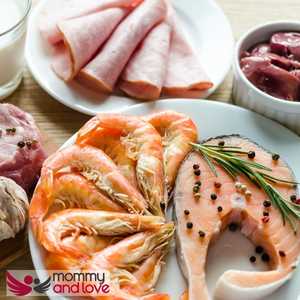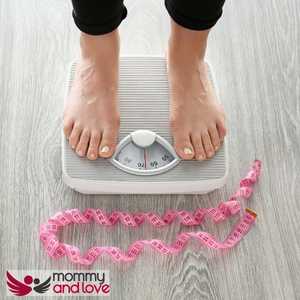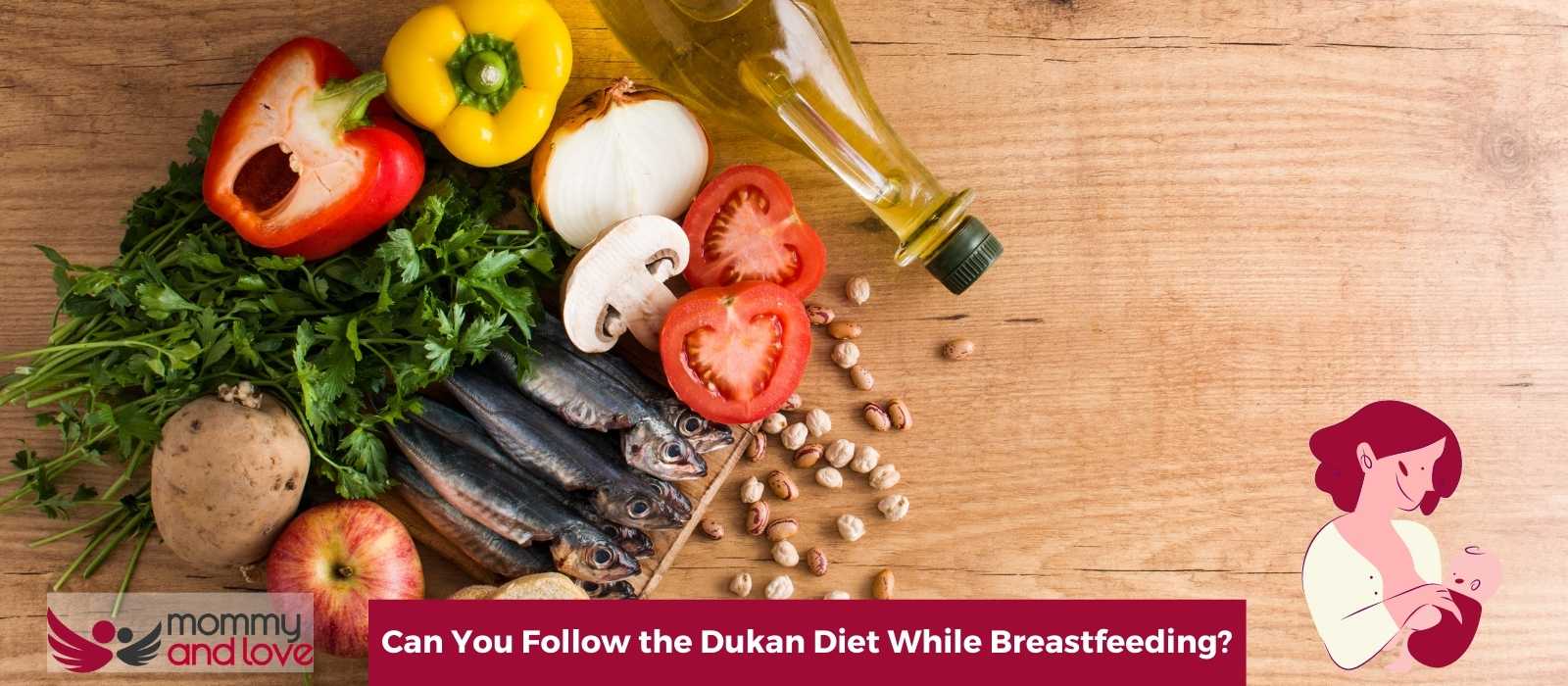The Dukan Diet is a popular high-protein, low-carb diet that has been gaining attention in recent years. It has been touted as a great way to lose weight quickly, but can it be followed while breastfeeding? After all, you have been absolutely exhausted learning what to do now that you have a baby.
In this blog post, we will take a look at the Dukan Diet and discuss whether or not it is safe to follow while breastfeeding.
What Is the Dukan Diet?

The Dukan diet is protein-rich and low in fat. The Dukan Diet book was published by Dr. Pierre Dukan, a French physician.
There are four phases to the diet: attack, cruise, consolidation, and stabilization.
The attack and cruise phases are designed to help you lose excess weight quickly.
The consolidation phase is when you add more foods back into your diet and the stabilization phase is when you maintain your weight.
Many people who were on this diet said that they lost weight, but it is important to speak with a dietician before starting any diet program.
If you’re on a Dukan diet, you can have brown rice with olive oil, nonfat dairy products, green tea, skim milk, veggies, and two servings of fruit per day.
Breastfeeding women can be on the Duken diet while lactating. It’s a great diet but they should also make sure they are getting the right amount of nutrition.
What Happens During the 4 Phases of the Dukan Diet?
Dukan dieting has 4 phases: attack, cruise, consolidation, and stabilization.
The attack phase is a kick-start to your journey on the Dukan diet. It is designed to jump-start your metabolism. This phase lasts for days, during which you will eat only proteins and fat-free foods. And you can eat as much as you want provided that they are allowed foods such as fat-free cheese.
Attack Phase
Oat bran is so important during this phase. It helps to promote healthy digestion. This is important because, during the attack phase, you’re consuming a lot of protein, which can be tough on your digestive system.
Oat bran is a high-fiber food and rich in fiber which helps to keep things moving smoothly through your digestive tract.
Another reason oat bran is important during the attack phase is that it helps you reach your goal weight more quickly.
You will also need to stay well hydrated and avoid consuming too much fat or carbohydrates. After the attack phase, you will move on to the cruise phase, which is a more sustainable way for the long term.
Cruise Phase of Diet
It is the second phase of the Dukan Diet, and it’s when you start to add more foods back into your diet. This phase can last for as long as you want, but most people stay in it until they reach their goal weight.
During this phase, you’ll add one food group per week. The order in which you add the food groups is up to you, but most people start with vegetables. You’ll eat unlimited amounts of the allowed foods, but you’ll still need to stick to the protein-rich foods that are the cornerstone of the diet.
You may be wondering how to know when you’ve reached your goal weight. The answer is simple: when you reach a weight that you’re happy with and that you can maintain without too much effort.
If you find yourself struggling to lose some weight during the cruise phase, don’t worry. This is perfectly normal, and there are a few things you can do to kick-start your weight loss again.
Consolidation Phase
The consolidation phase is when you reintroduce carbohydrates. This phase is important because it helps you transition back to a more normal way of eating while still maintaining your weight loss. So at this time, you might have already lost some weight.
Here are some tips for success during the consolidation phase:
- Add carbs slowly: Start by adding one serving of carbs per day and increase slowly from there.
- Choose healthy carbs: Complex carbs like whole grains are better than simple carbs like sugar.
- Watch your portion sizes: Even though you’re adding more foods back into your diet, you still need to be mindful of how much you’re eating. overeating can lead to weight gain. Read our guide to foods to avoid whilst breastfeeding.
- Stay active: Exercise is still important during this phase. It will help you maintain your weight loss and keep your metabolism going.
- Keep track of your progress: Weigh yourself regularly and take measurements to make sure you’re on track. If you start to gain weight, cut back on the carbs or increase your activity level.
Stabilization Phase
The stabilization phase of the Dukan Diet is when increasing your calorie intake. This phase can be tricky. But it is simply managing right balance between food and exercise
Here are some tips to help you during this phase:
- Develop healthy eating habits by adding more vegetables to your diet.
- Increase your protein intake.
- Exercise regularly.
- Drink water and plenty of fluids.
- Eat normally but pick protein only days within the week such as Dukan Protein Thursdays.
- Monitor your weight and body fat percentage.
How Can I Speed Up Weight Loss While Breastfeeding?

If you’re like most new moms, you’re probably eager to shed the extra weight you gained during normal pregnancy. And however much weight you have gained at the time, you can definitely lose it.
If you’re nursing, you may be wondering if there’s anything you can do to speed up weight loss.
While there’s no one most effective way for weight loss, there are certain things you can do to help your body burn more calories.
Here are a few tips:
- Eat healthy foods. This may seem like a no-brainer, but it’s important that nursing moms focus on eating nutrient-rich foods that will help their bodies function at their best. Eating plenty of fruits, vegetables, whole grains, low-fat milk products such as cheese (nonfat ones) and lean proteins can help boost your metabolism and energy levels, making it easier to lose some weight. Avoid fast food
- Get plenty of rest. When you’re sleep-deprived, your body doesn’t function as well and can hold onto extra weight. Make sure to get at least seven to eight hours of sleep each night.
- Drink plenty of water. Staying hydrated is essential for proper body function, and it can also help you feel full, making it less likely that you’ll overeat.
- Avoid processed foods. These are often low in nutrients, making them a poor choice if you’re trying to lose some weight. Instead, focus on eating whole, unprocessed foods.
- Be active. Getting regular exercise is one of the best things you can do for your health. If you have already lost weight, maintain it. Even if you’re just taking a brisk walk around the block, being active will help boost your metabolism and burn more calories.
Can I Start a Diet While Breastfeeding?
The answer to this question is a bit complicated. On one hand, you want to do what is best for your child and make sure the newborn baby’s nutrition is met.
On the other hand, you might be feeling pressure to lose weight and get back to your pre-pregnancy body.
So, what should you do?
The best answer is to wait until your child is at least two months old before starting any sort of diet. Or postpone it until she’s ready to start solids.
During the first few months, your body is still adjusting to the new demands of lactation.
If you try to diet during this time, you might end up feeling tired and run down. And this might lead to a decrease in your milk supply.
Certain foods can pass through your milk and bother your baby’s tummy.
Talk to your doctor or a lactation consultant before making any big changes to your diet. They can help you make sure that you are still getting the nutrients you need while also avoiding those that could upset your baby. We’ve done a guide to intermittent fasting and breastfeeding and a 1200 calories diet when breastfeeding.
After an emergency c section, you’ll need to take it easy for a few weeks. During this time, it’s important to eat nutritious fruits and veggies that will help your body heal. Read our guide to the best foods to eat for new moms.
Conclusion
So, can you be on the Dukan diet while breastfeeding? Yes. But you also have to make sure that your baby is getting the nutrients she needs, after all her health is your top priority. Your goal should be healthier eating instead of shedding weight.
You don’t have to jump into losing weight right away after giving birth. It takes time to shed the baby weight so use this time to bond with your baby.

This article was written by Sandra Baker – full time writer and the mother of four amazing kids (including twins!)
She’s also a breastfeeding counselor and has spent years helping new parents learn how to care for their children. When she’s not writing or caring for her children, Sandra likes to spend time reading and taking walks with her husband.




